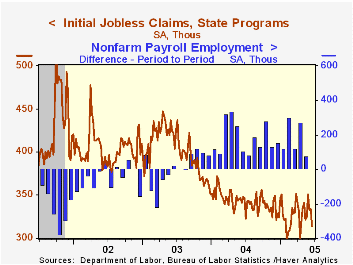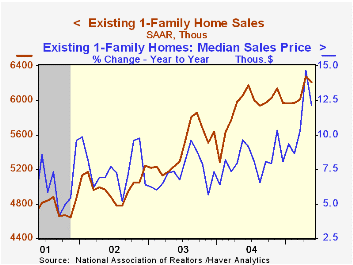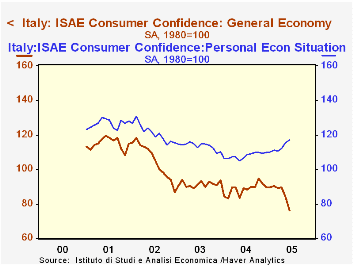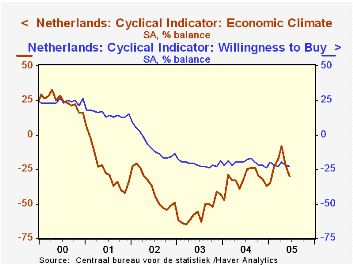 Global| Jun 23 2005
Global| Jun 23 2005Initial Claims for Unemployment Insurance Fell
by:Tom Moeller
|in:Economy in Brief
Summary
Initial claims for unemployment insurance fell a sharp 20,000 to 314,000 last week, the lowest level in two months. Consensus expectations had been for 330,000 claims and the prior week's figure was revised up slightly. The latest [...]

Initial claims for unemployment insurance fell a sharp 20,000 to 314,000 last week, the lowest level in two months. Consensus expectations had been for 330,000 claims and the prior week's figure was revised up slightly.
The latest figure covers the survey period for nonfarm payrolls in June and was down 8,000 (-2.5%) from the May period.
During the last ten years there has been a (negative) 75% correlation between the level of initial claims for unemployment insurance and the monthly change in payroll employment. There has been a (negative) 65% correlation with the level of continuing claims.
The four week moving average of initial claims fell slightly to 333,000 (-3.5% y/y).
A 38,000 decline in continuing claims for unemployment insurance retraced most of the prior week's downwardly revised 56,000 jump.
The insured unemployment rate fell back to 2.0% from 2.1% the prior week.
More Life vs. More Goods: Explaining Rising Health Expenditures from the Federal Reserve Bank of San Francisco can be found here.
| Unemployment Insurance (000s) | 06/18/05 | 06/11/05 | Y/Y | 2004 | 2003 | 2002 |
|---|---|---|---|---|---|---|
| Initial Claims | 314 | 334 | -9.8% | 343 | 402 | 404 |
| Continuing Claims | -- | 2,600 | -11.9% | 2,926 | 3,531 | 3,570 |
by Tom Moeller June 23, 2005

The National Association of Realtors reported that sales in May of existing homes declined a modest 0.7% to 7,130M versus the unrevised record during the prior month. Consensus expectations had been for roughly the same decline to 7.15M.
The data reflect closings of home sales in earlier months.Sales of single-family homes fell 1.1% to 6.210M and were down m/m throughout the country except in the West where they rose 1.4% (-1.3% y/y). Sales in the South slipped 0.8% (+5.6% y/y) and in the Midwest closings dropped 4.7% (0.0% y/y). In the Northeast sales fell 1.2% (+3.7% y/y).
The median price of an existing single family home rose slightly m/m to a record $204,600 (12.2% y/y).
The latest release from the National Association of Realtors is available here.
Fed Chairman Greenspan's Testimony on China is available here.
| Existing Home Sales (000, AR) | May | April | Y/Y | 2004 | 2003 | 2002 |
|---|---|---|---|---|---|---|
| Total Home Sales | 7,130 | 7,180 | 3.5% | 6,723 | 6,170 | 5,653 |
| Single Family Home Sales | 6,210 | 6,280 | 2.5% | 5,913 | 5,441 | 4,995 |
by Carol Stone June 23, 2005

Consumer confidence has eroded in Italy this month, with a decline of 1.4 percentage points in the ISAE indicator to 102.9 from 104.3 in May (seasonally adjusted, 1980=100). Concern over the overall economic situation is the broad source of discomfort, as people's assessment of the "general economic situation" dropped to 76.0 from 83.9 last month. While total confidence remains stronger than 2004 levels, the "general" indicator has fallen below last year's range.
At the same time, people see their own economic situations as holding up -- or at least not worsening as severely. The "personal situation" gauge climbed 1.8 points to 117.1, the highest level since September 2002. Associated survey items, such as household finances and financial expectations are moving in a narrow range, and buying attitudes toward major purchases and ability to save are actually improving. Attitudes about job prospects are mixed. This survey sees unemployment going higher, but new regulations give employers more flexibility about using temporary and part-time workers, so there is uncertainty about their implication for the number of jobs and the financial implications.
These considerations accompany the uncertainty over the EU constitution and the rise in energy costs. Perhaps the surprising thing about this survey is that its final outcome wasn't lower.
In the Netherlands, consumer confidence did drop more sharply, to -26 this month from -22 in May and -16 in April. The components here show the same pattern as in Italy, however, as the macro indicator, "economic climate" plunged to -30 from -22 in May and -8 in April. The "willingness to buy" indicator has been fairly stable, with -23 this month after -22 in May and -20 in April. The deterioration in these data break an improving trend that had run from mid-2003 to this spring, just before the vote over the EU constitution. This too suggests that consumers' worries are more over political uncertainties that about their own economic situation. Not though, please note, that they are optimistic about that, but just that their distress is less intense.
| Italy(Index, 1980=100) | June 2005 | May 2005 | June 2004 | 2004 | 2003 | 2002 |
|---|---|---|---|---|---|---|
| Consumer Confidence Indicator | 102.9 | 104.3 | 100.1 | 101.4 | 106.1 | 115.8 |
| General Economic Situation | 76.0 | 83.9 | 89.0 | 88.6 | 91.4 | 105.2 |
| Personal Economic Situation | 117.1 | 115.3 | 106.5 | 107.9 | 113.5 | 121.1 |
| Netherlands Consumer Confidence Survey (% balance) |
-26 | -22 | -25 | -25 | -35 | -25 |
Tom Moeller
AuthorMore in Author Profile »Prior to joining Haver Analytics in 2000, Mr. Moeller worked as the Economist at Chancellor Capital Management from 1985 to 1999. There, he developed comprehensive economic forecasts and interpreted economic data for equity and fixed income portfolio managers. Also at Chancellor, Mr. Moeller worked as an equity analyst and was responsible for researching and rating companies in the economically sensitive automobile and housing industries for investment in Chancellor’s equity portfolio. Prior to joining Chancellor, Mr. Moeller was an Economist at Citibank from 1979 to 1984. He also analyzed pricing behavior in the metals industry for the Council on Wage and Price Stability in Washington, D.C. In 1999, Mr. Moeller received the award for most accurate forecast from the Forecasters' Club of New York. From 1990 to 1992 he was President of the New York Association for Business Economists. Mr. Moeller earned an M.B.A. in Finance from Fordham University, where he graduated in 1987. He holds a Bachelor of Arts in Economics from George Washington University.
More Economy in Brief
 Global| Feb 05 2026
Global| Feb 05 2026Charts of the Week: Balanced Policy, Resilient Data and AI Narratives
by:Andrew Cates






